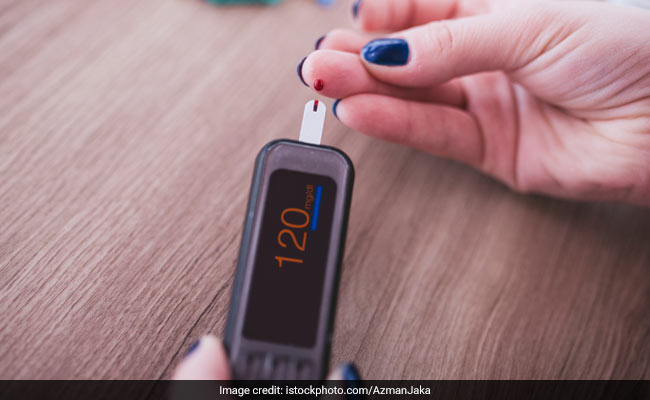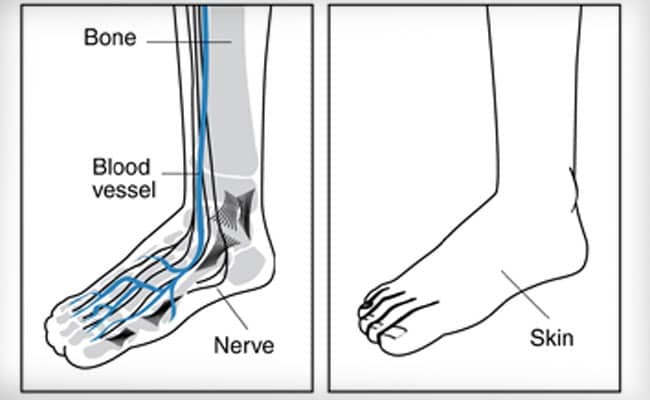Having too much glucose in the blood can damage many parts of the body. The feet need extra attention

High glucose in blood can damage numerous parts of the body
HIGHLIGHTS
- Check out for signs like sores and cuts on your feet, that do not heal
- If you have difficulty in moving your foot, diabetes can be the reason
- Diabetics should never go barefoot, even indoors
Too much glucose in the blood for a long time can cause diabetes problems. This high blood glucose, also called blood sugar, can damage many parts of the body, such as the heart, blood vessels, eyes, kidneys and feet. The problem with feet like loss of feeling in your feet can make it hard for you to tell if you have a blister or sore. If little sores aren't taken care of, they can get worse and turn into ulcers (serious, deep sores). If these ulcers become infected, you may have to go to the hospital or, in very serious cases, have a foot amputated (removed).
This information is about feet problems caused by diabetes. You will learn the things you can do each day and during each year to stay healthy and prevent diabetes problems.
Also read: World Diabetes Day: Is Type 2 Diabetes Reversible
High blood glucose from diabetes causes two problems that can hurt your feet:
- Neuropathy: It can affect the nerves which may lead to pain, heat or cold in your legs and feet cut on your foot may worsen the foot because of you do not know it is there.
- Peripheral Vascular Disease: It can affect blood flow, which makes hard for a sore or infection to heal. This problem is called peripheral vascular disease. Common with people who smoke.
Other common diabetes foot problems:
- Blisters can form if your shoe always rubs the same spot. Blisters can be infected with high blood sugar
- Ingrown nails happen when an edge of the nail grows into skin. The skin can get red and infected.
- Abunion forms when the big toe slants towards the small toes and the place between the bones near the base of your big toe grows big. This can get red, sore and infected. Planter warts are caused by the virus. The warts usually form on the bottoms of the feet.
- Dry and cracked skin can happen because the nerves in your legs and feet do not get the message to keep your skin soft and moist. Cracks allow germs to enter and cause infection.
- Athlete's foot is a very common skin infection caused by a fungus leading to itchiness, redness and cracking of the skin.
- Check your feet every day and report any changes to your doctor, nurse or podiatrist.
- If you find it difficult to check your own feet ask a friend or relative to help.

Foot care is essential for diabetics
Photo Credit: Dr Sujeet Jha
Also read: How Does Diabetes Affect Your Kidneys?
Danger signs to look out for:
- Sores and cuts that do not heal.
- Bright pink or red skin - if your skin is white; darker skin if your skin is brown or black
- Puffiness or swelling
- Difficulty in moving parts of the foot
- Skin that feels hot to the touch
- Weeping pus.
Never ignore pain in the feet or legs.
(Dr. Sujeet Jha is the Director of Institute of Endocrinology, Diabetes & Metabolism at Max Healthcare)
Disclaimer: This content including advice provides generic information only. It is in no way a substitute for qualified medical opinion. Always consult a specialist or your own doctor for more information. NDTV does not claim responsibility for this information.
DoctorNDTV is the one stop site for all your health needs providing the most credible health information, health news and tips with expert advice on healthy living, diet plans, informative videos etc. You can get the most relevant and accurate info you need about health problems like diabetes, cancer, pregnancy, HIV and AIDS, weight loss and many other lifestyle diseases. We have a panel of over 350 experts who help us develop content by giving their valuable inputs and bringing to us the latest in the world of healthcare.















